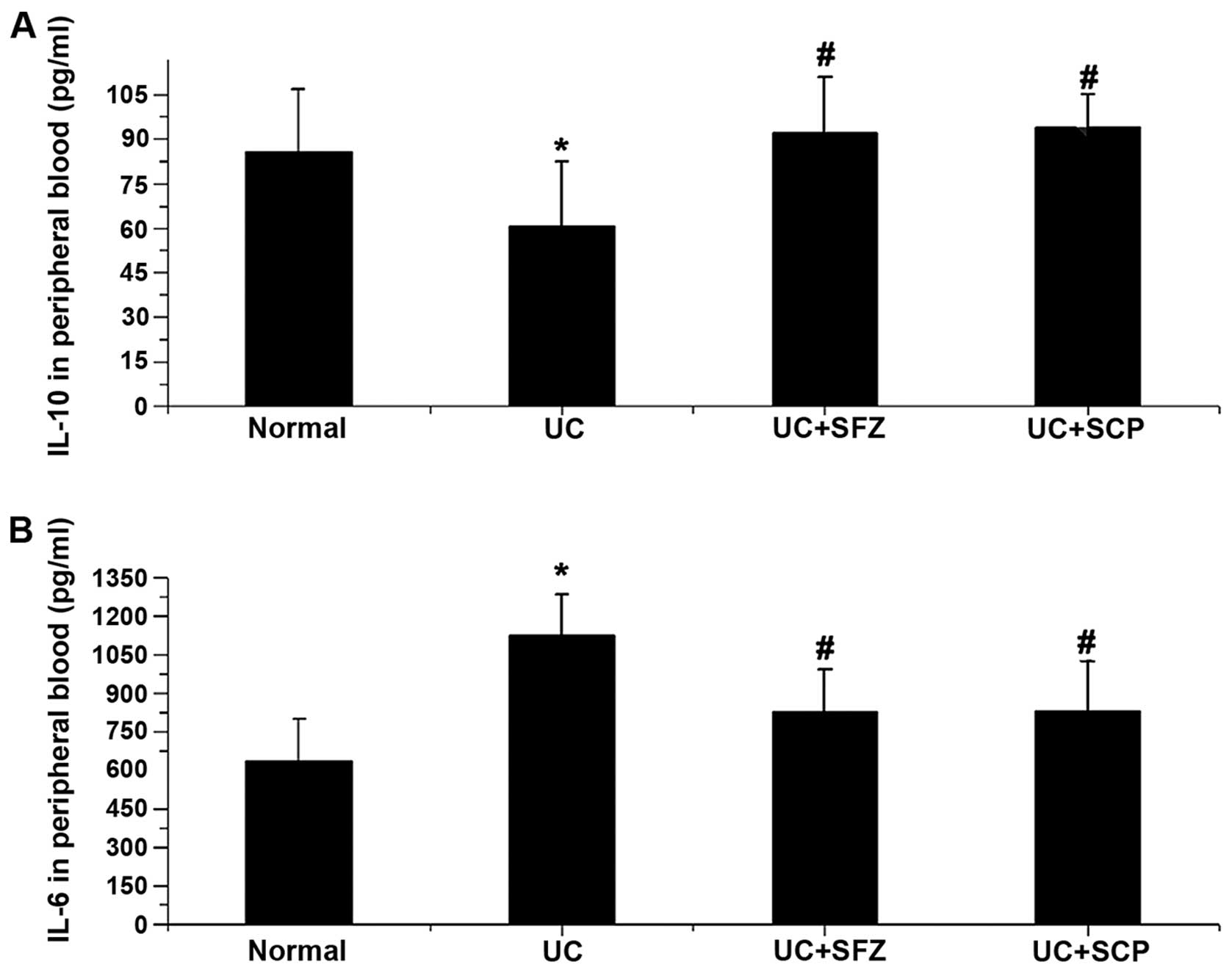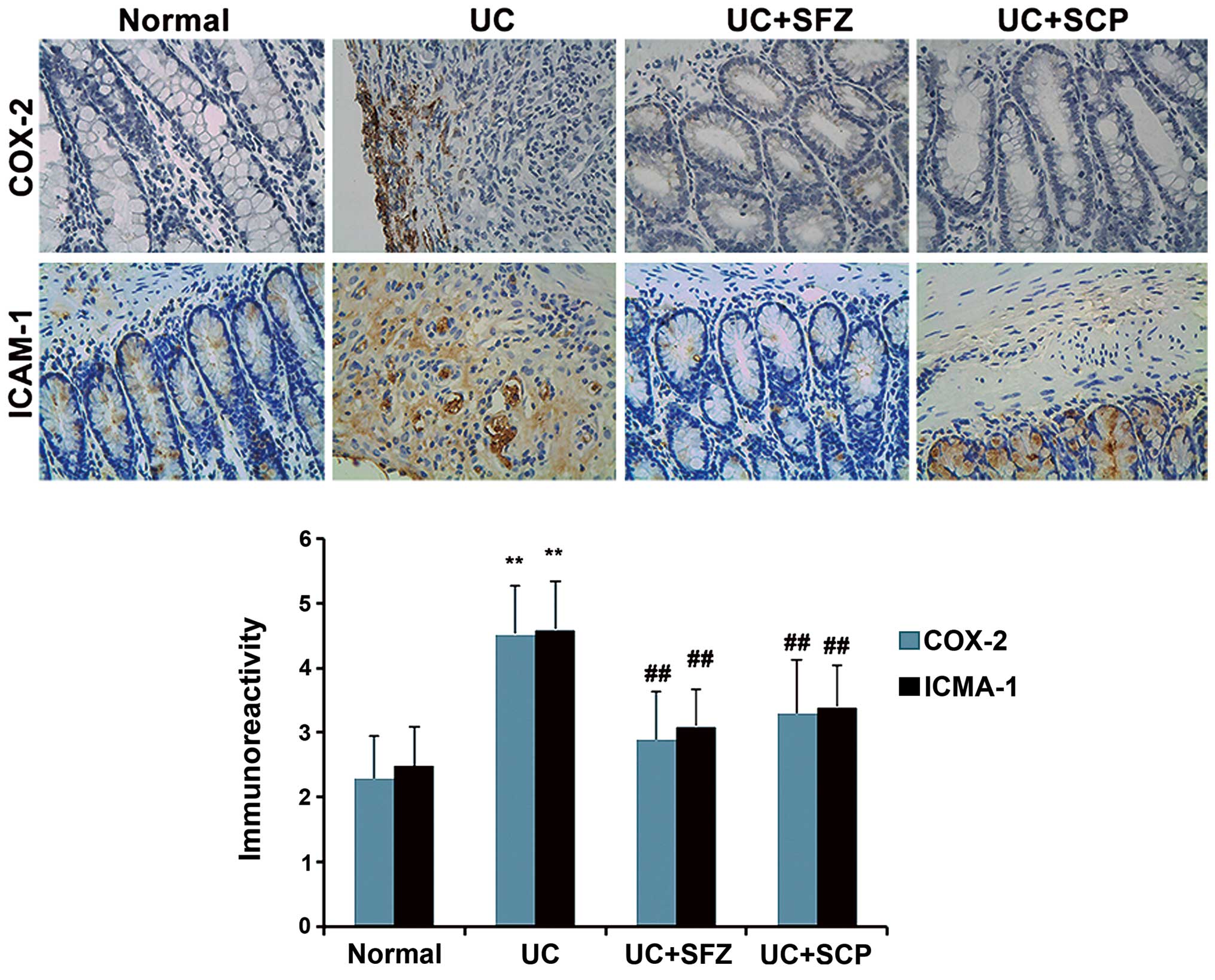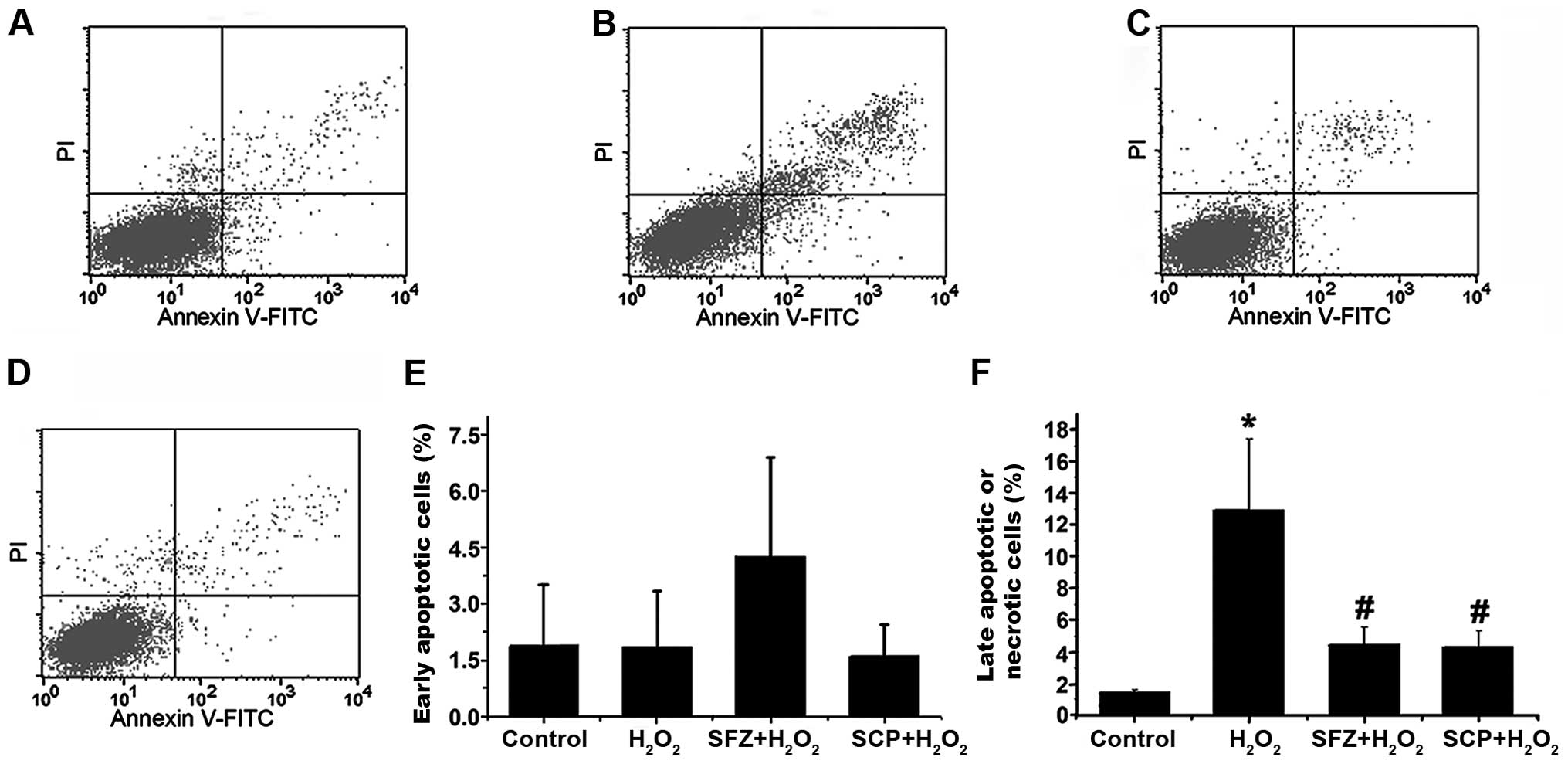|
1
|
Burisch J, Pedersen N, Čuković-Čavka S, et
al: EpiCom-group: East-West gradient in the incidence of
inflammatory bowel disease in Europe: The ECCO-EpiCom inception
cohort. Gut. 63:588–597. 2014. View Article : Google Scholar
|
|
2
|
Radwan P, Radwan-Kwiatek K, Tabarkiewicz
J, Radej S and Rolinski J: Enhanced phenotypic and functional
maturation of monocyte-derived dendritic cells from patients with
active Crohn's disease and ulcerative colitis. J Physiol Pharmacol.
61:695–703. 2010.
|
|
3
|
Zhao QJ, Yu YB, Zuo XL, Dong YY and Li YQ:
Milk fat globule-epidermal growth factor 8 is decreased in
intestinal epithelium of ulcerative colitis patients and thereby
causes increased apoptosis and impaired wound healing. Mol Med.
18:497–506. 2012.
|
|
4
|
Serrano D, Bhowmick T, Chadha R, Garnacho
C and Muro S: Intercellular adhesion molecule 1 engagement
modulates sphingomyelinase and ceramide, supporting uptake of drug
carriers by the vascular endothelium. Arterioscler Thromb Vasc
Biol. 32:1178–1185. 2012. View Article : Google Scholar : PubMed/NCBI
|
|
5
|
Kim YJ, Lee JS, Hong KS, Chung JW, Kim JH
and Hahm KB: Novel application of proton pump inhibitor for the
prevention of colitis-induced colorectal carcinogenesis beyond acid
suppression. Cancer Prev Res (Phila). 3:963–974. 2010. View Article : Google Scholar
|
|
6
|
Flannigan KL, Agbor TA, Blackler RW, et
al: Impaired hydrogen sulfide synthesis and IL-10 signaling
underlie hyperhomocysteinemia-associated exacerbation of colitis.
Proc Natl Acad Sci USA. 111:13559–13564. 2014. View Article : Google Scholar : PubMed/NCBI
|
|
7
|
Yu QT, Saruta M, Avanesyan A, Fleshner PR,
Banham AH and Papadakis KA: Expression and functional
characterization of FOXP3+ CD4+ regulatory T
cells in ulcerative colitis. Inflamm Bowel Dis. 13:191–199. 2007.
View Article : Google Scholar : PubMed/NCBI
|
|
8
|
Imaoka A, Shima T, Kato K, Mizuno S,
Uehara T, Matsumoto S, Setoyama H, Hara T and Umesaki Y:
Anti-inflammatory activity of probiotic Bifidobacterium:
Enhancement of IL-10 production in peripheral blood mononuclear
cells from ulcerative colitis patients and inhibition of IL-8
secretion in HT-29 cells. World J Gastroenterol. 14:2511–2516.
2008. View Article : Google Scholar : PubMed/NCBI
|
|
9
|
Chen X: Protective effects of quercetin on
liver injury induced by ethanol. Pharmacogn Mag. 6:135–141. 2010.
View Article : Google Scholar : PubMed/NCBI
|
|
10
|
Liu DY, Guan YM, Zhao HM, Yan DM, Tong WT,
Wan PT, Zhu WF, Liu HN and Liang XL: The protective and healing
effects of Si Shen Wan in trinitrobenzene sulphonic acid-induced
colitis. J Ethnopharmacol. 143:435–440. 2012. View Article : Google Scholar : PubMed/NCBI
|
|
11
|
Lindsay JO and Hodgson HJ: Review article:
The immunoregulatory cytokine interleukin-10 - a therapy for
Crohn’s disease. Aliment Pharmacol Ther. 15:1709–1716. 2001.
View Article : Google Scholar : PubMed/NCBI
|
|
12
|
Kim SJ, Kim YG, Kim DS, et al: Oldenlandia
diffusa ameliorates dextran sulphate sodium-induced colitis through
inhibition of NF-κB activation. Am J Chin Med. 39:957–969. 2011.
View Article : Google Scholar
|
|
13
|
Heinrich PC, Behrmann I, Müller-Newen G,
Schaper F and Graeve L: Interleukin-6-type cytokine signalling
through the gp130/Jak/STAT pathway. Biochem J. 334:297–314.
1998.PubMed/NCBI
|
|
14
|
Gracie DJ and Ford AC: Evidence-based
management of ulcerative colitis. Minerva Gastroenterol Dietol.
58:87–99. 2012.PubMed/NCBI
|
|
15
|
Ford AC, Bernstein CN, Khan KJ, Abreu MT,
Marshall JK, Talley NJ and Moayyedi P: Glucocorticosteroid therapy
in inflammatory bowel disease: Systematic review and meta-analysis.
Am J Gastroenterol. 106:590–599. 2011. View Article : Google Scholar : PubMed/NCBI
|
|
16
|
Prantera C and Marconi S:
Glucocorticosteroids in the treatment of inflammatory bowel disease
and approaches to minimizing systemic activity. Therap Adv
Gastroenterol. 6:137–156. 2013. View Article : Google Scholar : PubMed/NCBI
|
|
17
|
Oz HS, Chen T and de Villiers WJ: Green
tea polyphenols and sulfasalazine have parallel anti-inflammatory
properties in colitis models. Front Immunol. 4:1322013. View Article : Google Scholar : PubMed/NCBI
|
|
18
|
Margagnoni G, Pagnini C, Menasci F, Festa
S and Delle Fave G: Critical review of the evidence on
5-aminosalicilate for chemoprevention of colorectal cancer in
ulcerative colitis: A methodological question. Curr Clin Pharmacol.
9:84–90. 2014. View Article : Google Scholar
|
|
19
|
Watson S, Pensabene L, Mitchell P and
Bousvaros A: Outcomes and adverse events in children and young
adults undergoing tacrolimus therapy for steroid-refractory
colitis. Inflamm Bowel Dis. 17:22–29. 2011. View Article : Google Scholar
|
|
20
|
Kruis W, Schreiber S, Theuer D, et al: Low
dose balsalazide (1.5 g twice daily) and mesalazine (0.5 g three
times daily) maintained remission of ulcerative colitis but high
dose balsalazide (3.0 g twice daily) was superior in preventing
relapses. Gut. 49:783–789. 2001. View Article : Google Scholar : PubMed/NCBI
|
|
21
|
Minaiyana M, Ghannadib A, Mahzounic P and
Jaffari-Shirazid E: Comparative study of Berberis vulgaris fruit
extract and berberine chloride effects on acetic acid-induced
colitis in rats. Iran J Pharm Res. 10:97–104. 2010.
|
|
22
|
Atyabi F, Vahabzadeh R and Dinarvand R:
Preparation of ethylcellulose coated gelatin microspheres as a
multiparticulate colonic delivery system for 5-aminosalicilic acid.
Iran J Pharm Res. 2:81–86. 2004.
|
|
23
|
Zhang J, Gao W, Hu X, Liu Z and Liu C: The
influence of compatibility of traditional Chinese medicine on the
pharmacokinetic of main components in Fructus aurantii. J
Ethnopharmacol. 144:277–283. 2012. View Article : Google Scholar : PubMed/NCBI
|
|
24
|
Chinese Pharmacopoeia Commission: Chinese
Pharmacopoeia Commission: Pharmacopoeia of the People’s Republic of
China. Chemical Industry Press; Beijing: 2005
|
|
25
|
Liu DY, Zhao HM, Zhao N, Xin ZP and Lu AP:
Pharmacological effects of ba-wei-xi-lei powder on ulcerative
colitis in rats with enema application. Am J Chin Med. 34:461–469.
2006. View Article : Google Scholar : PubMed/NCBI
|
|
26
|
Vilela EG, Torres HO, Martins FP, Ferrari
ML, Andrade MM and Cunha AS: Evaluation of inflammatory activity in
Crohn's disease and ulcerative colitis. World J Gastroenterol.
18:872–881. 2012. View Article : Google Scholar : PubMed/NCBI
|
|
27
|
Ślebioda TJ and Kmieć Z: Tumour necrosis
factor superfamily members in the pathogenesis of inflammatory
bowel disease. Mediators Inflamm. 2014:3251292014. View Article : Google Scholar : PubMed/NCBI
|
|
28
|
Boschetti G, Nancey S, Sardi F, Roblin X,
Flourié B and Kaiserlian D: Therapy with anti-TNFα antibody
enhances number and function of Foxp3(+) regulatory T cells in
inflammatory bowel diseases. Inflamm Bowel Dis. 17:160–170. 2011.
View Article : Google Scholar
|
|
29
|
Heller F, Florian P, Bojarski C, Richter
J, Christ M, Hillenbrand B, Mankertz J, Gitter A, Burgel N and
Fromm M: Interleukin-13 is the key effector Th2 cytokine in
ulcerative colitis that affects epithelial tight junctions,
apoptosis, and cell restitution. Gastroenterology. 129:550–564.
2005. View Article : Google Scholar : PubMed/NCBI
|
|
30
|
Kamikozuru K, Fukunaga K, Hirota S, et al:
The expression profile of functional regulatory T cells,
CD4+CD25high+/forkhead box protein
P3+, in patients with ulcerative colitis during active
and quiescent disease. Clin Exp Immunol. 156:320–327. 2009.
View Article : Google Scholar : PubMed/NCBI
|
|
31
|
Flower RJ: Drugs which inhibit
prostaglandin biosynthesis. Pharmacol Rev. 26:33–67.
1974.PubMed/NCBI
|
|
32
|
Kim DS, Kim SJ, Kim MC, Jeon YD, Um JY and
Hong SH: The therapeutic effect of chelidonic acid on ulcerative
colitis. Biol Pharm Bull. 35:666–671. 2012. View Article : Google Scholar : PubMed/NCBI
|
|
33
|
Talero E, Sánchez-Fidalgo S, Villegas I,
de la Lastra CA, Illanes M and Motilva V: Role of different
inflammatory and tumor biomarkers in the development of ulcerative
colitis-associated carcinogenesis. Inflamm Bowel Dis. 17:696–710.
2011. View Article : Google Scholar
|
|
34
|
Giriş M, Depboylu B, Doğru-Abbasoğlu S,
Erbil Y, Olgaç V, Aliş H, Aykaç-Toker G and Uysal M: Effect of
taurine on oxidative stress and apoptosis-related protein
expression in trinitrobenzene sulphonic acid-induced colitis. Clin
Exp Immunol. 152:102–110. 2008. View Article : Google Scholar
|
|
35
|
Lee MJ, Lee JK, Choi JW, et al:
Interleukin-6 induces S100A9 expression in colonic epithelial cells
through STAT3 activation in experimental ulcerative colitis. PLoS
One. 7:e388012012. View Article : Google Scholar : PubMed/NCBI
|
|
36
|
Qiu W, Wu B, Wang X, Buchanan ME, Regueiro
MD, Hartman DJ, Schoen RE, Yu J and Zhang L: PUMA-mediated
intestinal epithelial apoptosis contributes to ulcerative colitis
in humans and mice. J Clin Invest. 121:1722–1732. 2011. View Article : Google Scholar : PubMed/NCBI
|
|
37
|
Negoescu A, Guillermet C, Lorimier P,
Brambilla E and Labat-Moleur F: Importance of DNA fragmentation in
apoptosis with regard to TUNEL specificity. Biomed Pharmacother.
52:252–258. 1998. View Article : Google Scholar : PubMed/NCBI
|
|
38
|
Vermes I, Haanen C, Steffens-Nakken H and
Reutelingsperger C: A novel assay for apoptosis. Flow cytometric
detection of phosphatidylserine expression on early apoptotic cells
using fluorescein labelled Annexin V. J Immunol Methods. 184:39–51.
1995. View Article : Google Scholar : PubMed/NCBI
|
|
39
|
Samarghandian S, Afshari JT and Davoodi S:
Honey induces apoptosis in renal cell carcinoma. Pharmacogn Mag.
7:46–52. 2011. View Article : Google Scholar : PubMed/NCBI
|
|
40
|
Lecoeur H: Nuclear apoptosis detection by
flow cytometry: Influence of endogenous endonucleases. Exp Cell
Res. 277:1–14. 2002. View Article : Google Scholar : PubMed/NCBI
|
|
41
|
Yu JZ, Wu XL, Yu B, Dai CQ, Liu KL,
Guo-Qiang Q, Zhou GX, Lu SH, Ju H and Chen XY: The suppression
effects of desacetyluvaricin on hepatocellular carcinoma and its
possible mechanism. Pharmacogn Mag. 8:225–230. 2012. View Article : Google Scholar : PubMed/NCBI
|
|
42
|
Walters J, Pop C, Scott FL, Drag M, Swartz
P, Mattos C, Salvesen GS and Clark AC: A constitutively active and
uninhibitable caspase-3 zymogen efficiently induces apoptosis.
Biochem J. 424:335–345. 2009. View Article : Google Scholar : PubMed/NCBI
|




















